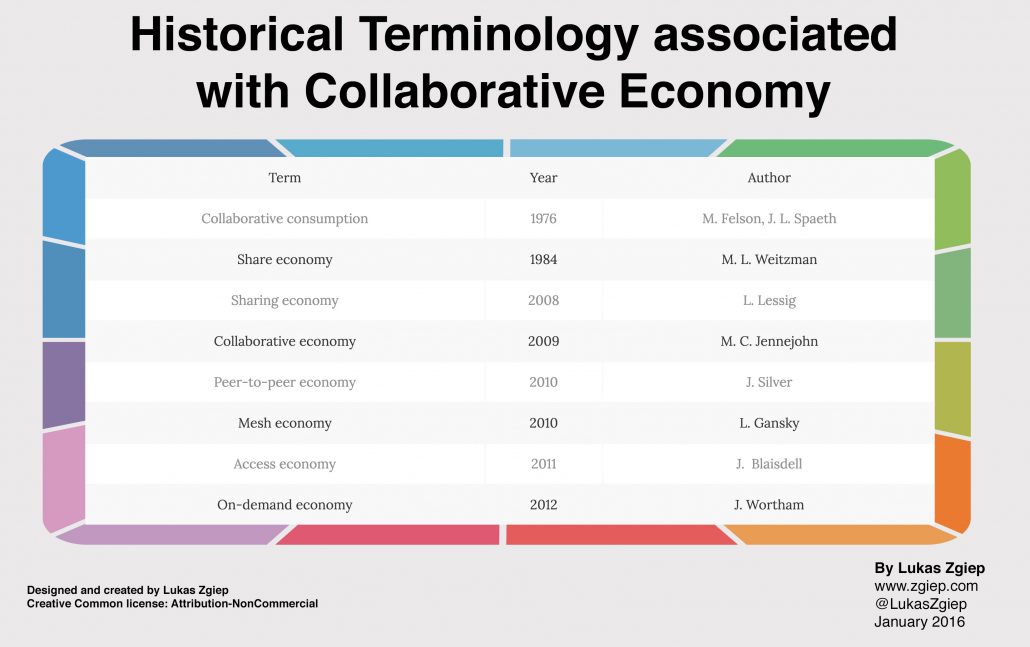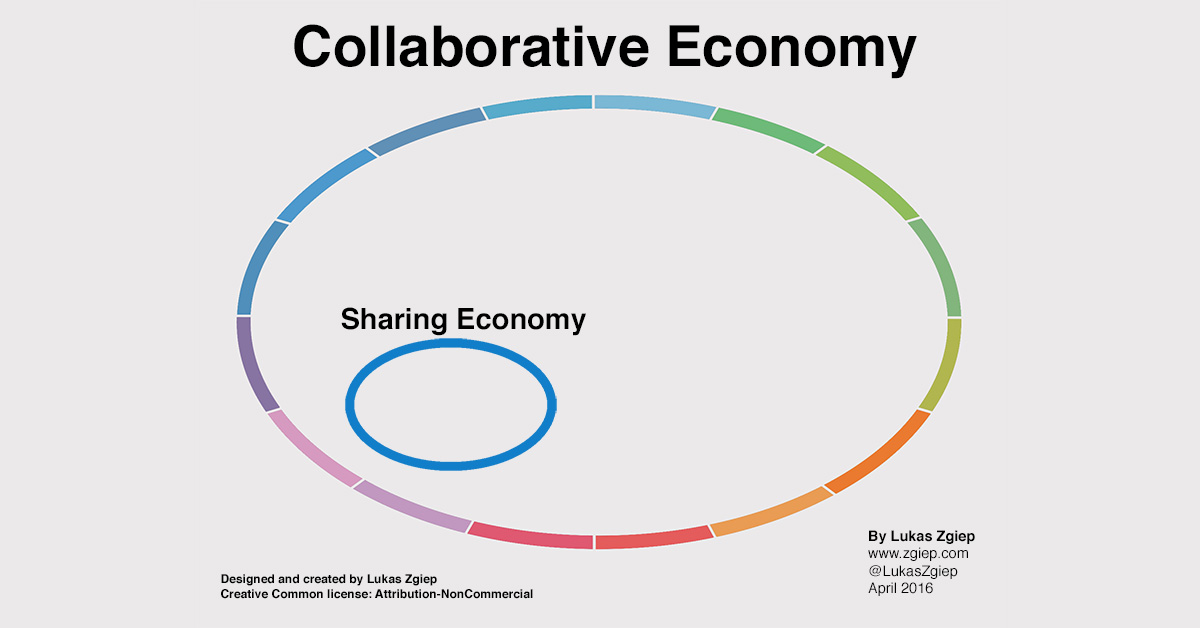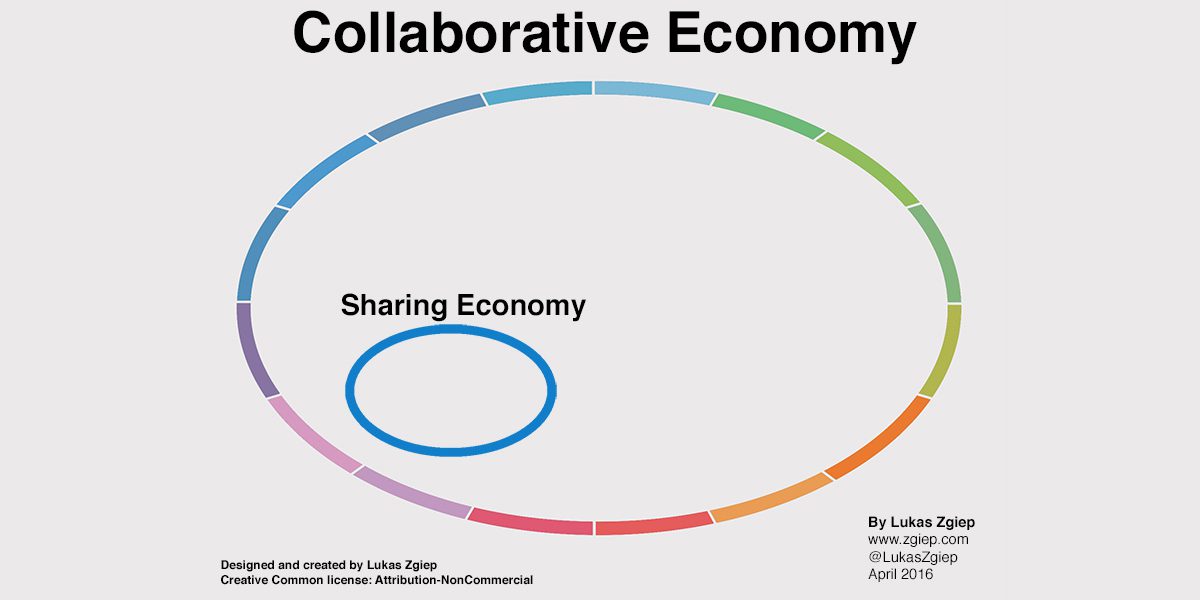Currently, over 9,000 companies around the world operate in the collaborative economy model. According to global estimates of PwC, these companies will achieve an over 22-fold increase in revenues from USD 15 billion in 2014 to USD 335 billion in 2025. Hence, more and more people and institutions, including governmental ones, at the national and European level, are interested in the phenomenon of cooperation economy. From September 25, 2015 to January 6, 2016, the European Commission conducted the first public consultation on the economy of cooperation. The most frequently cited examples of this trend are Uber, BlaBlaCar or Airbnb, but this discussion must not forget about the entire army of smaller and domestic companies such as: jadezabiore.pl, taketask.pl, polakpotrafi.pl, iparkomat.com, ranozebrano.pl, sirlocal.pl, pomocam.to, wulu.pl, trejdoo.com, inonecar.com.
Economics based on cooperation between people using technology is a relatively new phenomenon, which is why there is a discrepancy in its definition. This leads to a kind of dissonance of concepts and terminology, especially in Polish, e.g. sharing economy can have many connotations, sharing economy, sharing economy, shared economy, etc. I must admit that the more I analyzed various definitions, the more fascinated me what the process of creating new definitions looks like in the 21st century. Some people who write about the same phenomenon define it differently, causing some kind of information chaos. I believe that from a scientific and practical point of view, it is worth organizing and systematizing the nomenclature – in the table below I present a chronological list of terms and definitions from around the world around the phenomenon in question.
Chronological collection of concepts related to the collaborative economy

A few years ago, when the companies Uber, Airbnb, Bla Bla Car, etc. were founded, the era of the sharing economy was announced. Many articles promoting the disruption of the sharing economy model appeared. The word disruptive has no direct equivalent in Polish – it means a technology, idea or idea that significantly changes the rules of operation of a given industry and, thanks to a high dose of innovation, means that a given thing or service can be performed in a much more effective way than before. Examples of disruptive technologies are: electricity, steam engine, internet, smartphones.
The two most popular terms – sharing economy and collaborative economy are sometimes used interchangeably, both in scientific publications and in the popular science press. The problem is that sharing – i.e. sharing, does not take place in all such projects, and that is why recently there are more and more voices that sharing economy is a misleading name. In Why the term sharing economy needs to die, the author emphatically emphasizes why the word sharing is not appropriate. When using Airbnb, we de facto rent someone’s apartment, and we do not share it with someone, using Uber we rent someone with their car, and we do not share the car with someone else. Alex Hern in The Guardian strongly opposes misleading consumers. Olivier Blanchard is of a similar opinion in “Stop calling it sharing economy that isn’t what it is”, who also emphasizes the fact that the word sharing means sharing, and not always goods or services are shared between users – if someone specifically comes to the place indicated by place us and take us to the desired address (eg Uber), this is a service, not car sharing. In turn, Harvard Business Review in “The Sharing Economy Isn’t About Sharing at All” proposes to change the name from sharing to access, in line with the principle that we pay for access to goods and services.
It is obvious that sharing occurs in situations where people use or share goods and services together, e.g. Next bike, Car2go, BlaBlaCar, jadezabiore.pl, DriveNow, Couchsufring, etc. These are classic examples of the sharing economy. However, there are many more companies that are based on a similar idea (collaboration enabled by technology), but without the sharing element, e.g. polakpotrafi.pl, Etsy, Bitcoin, Luxe, Kickstarter, trejdoo.com, Udemy, Ebay, Doctor On Demand, Khan Academy, Coursera, etc. This does not mean, however, that the concept of sharing economy is bad, it is much narrower and is 100% included in the concept of collaborative economy as part of a larger idea.

Of course, cooperation accompanies us as a human species practically from the very beginning – once part of the herd stayed in the cave to protect their belongings and offspring from danger, and some took risks and went hunting for mammoths to feed all members of the group. Simply put, it can be said that the entire economy is based on cooperation, and from a philosophical point of view, it is exactly like that. The collaborative economy model, however, is based on two very important pillars – the first, which is not even the technology itself, but universal access to it via mobile devices, and the second, which is reputation systems, e.g. stars, points, etc. Many studies confirm that we trust strangers with a good opinion on the Internet as much as we trust our friends. In the 21st century, the ability to use new technologies, not only the current ones, such as computers and smartphones, but also the future ones: AI, VR, EV, AR, 3D printing and others that we do not know yet, may turn out to be more important from an existential point of view than writing or reading. There are already widely available tools to which we speak, and they quickly change our speech into text (also in our difficult Polish language) – an example of which is this article. The constantly growing popularity of audiobooks and IVONA text reading systems also contributes to easier and faster assimilation of information, and thanks to the possibility of increasing the speed of the listened text, we can listen to more than we could read.
In the 21st century, new business models emerged which, thanks to technology, enable us to use our resources better and more efficiently. The sharing economy includes companies that enable the sharing of goods and services between different people. It is worth talking about a much broader phenomenon, which is the collaborative economy, because thanks to the cooperation enabled by technology, people can not only share, but also, inter alia, co- (create, finance, design, teach, heal, work, borrow, help).
Cheers,
LSZ

